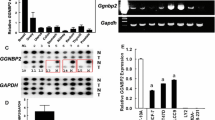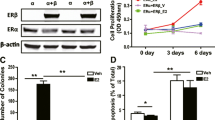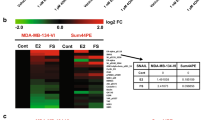Abstract
Estrogen receptor β (ERβ) is widely expressed in mammary epithelium. ERβ expression is reported to decline during carcinogenesis of the breast and other tissues. In this study, we examined the consequences of a loss of ERβ expression in mammary epithelial cells. We knocked down ERβ transcript levels in human mammary epithelial MCF-10A cells and in MCF-7 breast cancer cells by means of stable transfection with a specific shRNA plasmid. ERβ knockdown resulted in a significant growth increase of both cell types in a ligand-independent manner. This effect was accompanied by elevated cyclin A2 expression in MCF-10A cells and by decreased expression of growth-inhibitory p21/WAF and epithelial cell marker cytokeratine 8 in both cell lines. Transfection of ERβ shRNA did not alter the absent proliferative estrogen response of MCF-10A cells, but conferred sensitivity to selective estrogen receptor modulator tamoxifen to this cell line. In contrast, ERβ knockdown diminished estrogen responsiveness of MCF-7 breast cancer cells and also weakened the effect of tamoxifen on this cell line. These ligand-dependent effects only observed in MCF-7 cells exhibiting a high ERα/β ratio were accompanied by smaller estrogenic repression of p21/WAF expression, an impaired tamoxifen-triggered induction of this gene and by relative downregulation of ERα and cyclin A2 transcript levels. Our data suggest that ERβ exerts antiproliferative effects both on MCF-10A and MCF-7 cells in a ligand- and ERα-independent manner by regulation of p21/WAF or cyclin A2 gene expression. Knockdown of ERβ in both cell types was sufficient to significantly decrease transcript levels of epithelial cell marker cytokeratin 8. The results of this study support the hypothesis that ERβ acts as a tumor suppressor in mammary epithelium.





Similar content being viewed by others
References
Ali S, Coombes RC (2002) Endocrine-responsive breast cancer and strategies for combating resistance. Nat Rev Cancer 2(2):101–112. doi:10.1038/nrc721
Kuiper GG, Enmark E, Pelto-Huikko M, Nilsson S, Gustafsson J-A (1996) Cloning of a novel receptor expressed in rat prostate and ovary. Proc Natl Acad Sci USA 93(12):5925–5930. doi:10.1073/pnas.93.12.5925
Leygue E, Dotzlaw H, Watson P, Murphy L (1998) Altered estrogen receptor alpha and beta mRNA expression during human breast tumorigenesis. Cancer Res 58:3197–3201
Jarvinen T, Pelto-Huikko M, Holli K, Isola J (2000) Estrogen receptor beta is coexpressed with ERalpha and PR and associated with nodal status grade and proliferation rate in breast cancer. Am J Pathol 156:29–35
Forster C, Makela S, Warri A, Kietz S, Becker D, Hultenby K, Warner M, Gustafsson J (2002) Involvement of estrogen receptor b in terminal differentiation of mammary gland epithelium. Proc Natl Acad Sci USA 99:15578–15583. doi:10.1073/pnas.192561299
Hall J, McDonnell D (1999) The estrogen receptor betaisoform (ERbeta) of the human estrogen receptor modulates ERalpha transcriptional activity and is a key regulator of the cellular response to estrogens and antiestrogens. Endocrinology 140:5566–5578. doi:10.1210/en.140.12.5566
Weihua Z, Saji S, Makinen S, Cheng G, Jensen E, Warner M, Gustaffson JA (2000) Estrogen receptor (ER) b a modulator of ERa in the uterus. Proc Natl Acad Sci USA 97:5936–5941. doi:10.1073/pnas.97.11.5936
Peng B, Lu B, Leygue E, Murphy L (2003) Putative functional characteristics of human estrogen receptor-beta isoforms. J Mol Endocrinol 30:13–29. doi:10.1677/jme.0.0300013
Roger P, Sahla M, Makela S, Gustafsson JA, Baldet P, Rochefort H (2001) Decreased expression of estrogen receptor beta protein in proliferative preinvasive mammary tumors. Cancer Res 61:2537–2541
Dotzlaw H, Leygue E, Watson P, Murphy L (1999) Estrogen receptor-b messenger RNA expression in human breast tumor biopsies: relationship to steroid receptor status and regulation by progestins. Cancer Res 59:529–532
Speirs V (2002) Oestrogen receptor beta in breast cancer: good bad or still too early to tell? J Pathol 197:143–147. doi:10.1002/path.1072
Fuqua S, Schiff R, Parra I, Friedrichs W, Su J, McKee D, Slentz-Kesler K, Moore L, Willson T, Moore J (1999) Expression of wild-type estrogen receptor beta and variant isoforms in human breast cancer. Cancer Res 59:5425–5428
Saji S, Omoto Y, Shimizu C, Warner M, Hayashi Y, Horiguchi S, Watanabe T, Hayashi S, Gustafsson J (2002) Expression of estrogen receptor (ER) (beta)cx protein in ER(alpha)-positive breast cancer: specific correlation with progesterone receptor. Cancer Res 62:4849–4853
Saji S, Omoto Y, Shimizu C, Horiguchi S, Watanabe T, Funata N, Hayash S, Gustafsson J, Toi M (2002) A Clinical impact of assay of estrogen receptor beta cx in breast cancer. Breast Cancer 9:303–307. doi:10.1007/BF02967608
Mann S, Laucirica R, Carlson N, Younes PS, Ali N, Younes A, Li Y, Younes M (2001) Estrogen receptor beta expression in invasive breast cancer. Hum Pathol 32(1):113–118. doi:10.1053/hupa.2001.21506
Murphy L, Cherlet T, Lewis A, Banu Y, Watson P (2003) New insights into estogen receptor function in human breast cancer. Ann Med 35:614–631. doi:10.1080/07853890310014579
Esslimani-Sahla M, Simony-Lafontaine J, Kramar A, Lavaill R, Mollevi C, Warner M, Gustafsson J-A, Rochefort H (2004) Estrogen receptor beta (ERbeta) level but not its ERbeta-cx variant helps to predict tamoxifen resistance in breast cancer. Clin Cancer Res 10:5769–5776. doi:10.1158/1078-0432.CCR-04-0389
Fleming F, Hill A, McDermott E, O’Higgins N, Young L (2004) Differential recruitment of coregulator proteins steroid receptor coactivator-1 and silencing mediator for retinoid and thyroid receptors to the estrogen receptorestrogen response element by beta-estradiol and 4-hydroxytamoxifen in human breast cancer. J Clin Endocrinol Metab 89:375–383. doi:10.1210/jc.2003-031048
Hopp TA, Weiss HL, Parra IS, Cui Y, Osborne CK, Fuqua SA (2004) Low levels of estrogen receptor beta protein predict resistance to tamoxifen therapy in breast cancer. Clin Cancer Res 10(22):7490–7499. doi:10.1158/1078-0432.CCR-04-1114
Skliris G, Munot K, Bell S, Carder P, Lane S, Horgan K, Lansdown M, Parkes A, Hanby A, Markham A, Speirs V (2003) Reduced expression of oestrogen receptor beta in invasive breast cancer and its re-expression using DNA methyltransferase inhibitors in a cell line model. J Pathol 201:213–220. doi:10.1002/path.1436
Treeck O, Juhasz-Boess I, Lattrich C, Horn F, Goerse R, Ortmann O (2008) Effects of exon-deleted estrogen receptor β transcript variants on growth, apoptosis and gene expression of human breast cancer cell lines. Breast Cancer Res Treat 110(3):507–520. doi:10.1007/s10549-007-9749-7
Paruthiyil S, Parmar H, Kerekatte V, Cunha GR, Firestone GL, Leitman DC (2004) Estrogen receptor beta inhibits human breast cancer cell proliferation and tumor formation by causing a G2 cell cycle arrest. Cancer Res 64(1):423–428. doi:10.1158/0008-5472.CAN-03-2446
Ståhlberg A, Åman P, Ridell B, Mostad P, Kubista M (2003) A quantitative real-time PCR method for detection of B-lymphocyte monoclonality by comparison of kappa and lambda immunoglobulin light chain expression. Clin Chem 49(1):51–59. doi:10.1373/49.1.51
Livak KJ, Schmittgen TD (2001) Analysis of relative gene expression data using real-time quantitative PCR and the 2(−ΔΔCT) method. Methods 25(4):402–408. doi:10.1006/meth.2001.1262
Cheng J, Lee EJ, Madison LD, Lazennec G (2004) Expression of estrogen receptor beta in prostate carcinoma cells inhibits invasion and proliferation and triggers apoptosis. FEBS Lett 566(1–3):169–172. doi:10.1016/j.febslet.2004.04.025
Soule HD et al (1990) Isolation and characterization of a spontaneously immortalized human breast epithelial MCF- 10. Cancer Res 50:6075–6086
Fuchs IB, Lichtenegger W, Buehler H, Henrich W, Stein H, Kleine-Tebbe A, Schaller G (2002) The prognostic significance of epithelial-mesenchymal transition in breast cancer. Anticancer Res 22(6A):3415–3419
Bonin S, Brunetti D, Benedetti E, Dotti I, Gorji N, Stanta G (2008) Molecular characterisation of breast cancer patients at high and low recurrence risk. Virchows Arch 452(3):241–250. doi:10.1007/s00428-007-0570-9
Honma N, Horii R, Iwase T, Saji S, Younes M, Takubo K, Matsuura M, Ito Y, Akiyama F, Sakamoto G (2008) Clinical importance of estrogen receptor-beta evaluation in breast cancer patients treated with adjuvant tamoxifen therapy. J Clin Oncol 26(22):3727–3734. doi:10.1200/JCO.2007.14.2968
Hodges-Gallagher L, Valentine CD, El Bader S, Kushner PJ (2008) Estrogen receptor beta increases the efficacy of antiestrogens by effects on apoptosis and cell cycling in breast cancer cells. Breast Cancer Res Treat 109(2):241–250. doi:10.1007/s10549-007-9640-6
Acknowledgments
We thank Helena Houlihan and Gerhard Piendl for their excellent technical assistance.
Author information
Authors and Affiliations
Corresponding author
Rights and permissions
About this article
Cite this article
Treeck, O., Lattrich, C., Springwald, A. et al. Estrogen receptor beta exerts growth-inhibitory effects on human mammary epithelial cells. Breast Cancer Res Treat 120, 557–565 (2010). https://doi.org/10.1007/s10549-009-0413-2
Received:
Accepted:
Published:
Issue Date:
DOI: https://doi.org/10.1007/s10549-009-0413-2




